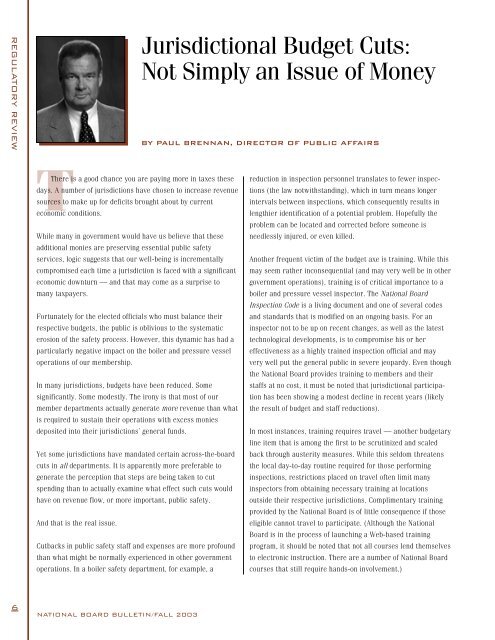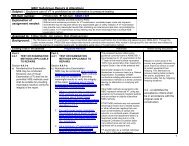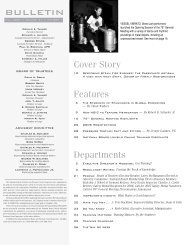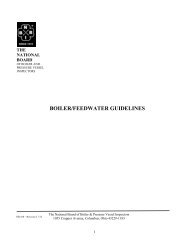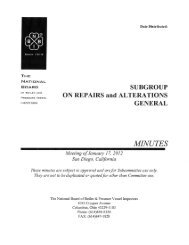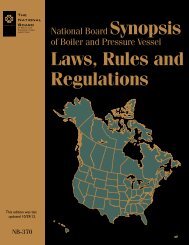bulletin - The National Board of Boiler and Pressure Vessel Inspectors
bulletin - The National Board of Boiler and Pressure Vessel Inspectors
bulletin - The National Board of Boiler and Pressure Vessel Inspectors
You also want an ePaper? Increase the reach of your titles
YUMPU automatically turns print PDFs into web optimized ePapers that Google loves.
REGULATORY REVIEW<br />
6<br />
<strong>The</strong>re is a good chance you are paying more in taxes these<br />
days. A number <strong>of</strong> jurisdictions have chosen to increase revenue<br />
sources to make up for deficits brought about by current<br />
economic conditions.<br />
While many in government would have us believe that these<br />
additional monies are preserving essential public safety<br />
services, logic suggests that our well-being is incrementally<br />
compromised each time a jurisdiction is faced with a significant<br />
economic downturn — <strong>and</strong> that may come as a surprise to<br />
many taxpayers.<br />
Fortunately for the elected <strong>of</strong>ficials who must balance their<br />
respective budgets, the public is oblivious to the systematic<br />
erosion <strong>of</strong> the safety process. However, this dynamic has had a<br />
particularly negative impact on the boiler <strong>and</strong> pressure vessel<br />
operations <strong>of</strong> our membership.<br />
In many jurisdictions, budgets have been reduced. Some<br />
significantly. Some modestly. <strong>The</strong> irony is that most <strong>of</strong> our<br />
member departments actually generate more revenue than what<br />
is required to sustain their operations with excess monies<br />
deposited into their jurisdictions’ general funds.<br />
Yet some jurisdictions have m<strong>and</strong>ated certain across-the-board<br />
cuts in all departments. It is apparently more preferable to<br />
generate the perception that steps are being taken to cut<br />
spending than to actually examine what effect such cuts would<br />
have on revenue flow, or more important, public safety.<br />
And that is the real issue.<br />
Cutbacks in public safety staff <strong>and</strong> expenses are more pr<strong>of</strong>ound<br />
than what might be normally experienced in other government<br />
operations. In a boiler safety department, for example, a<br />
NATIONAL BOARD BULLETIN/FALL 2003<br />
Jurisdictional Budget Cuts:<br />
Not Simply an Issue <strong>of</strong> Money<br />
BY PAUL BRENNAN, DIRECTOR OF PUBLIC AFFAIRS<br />
reduction in inspection personnel translates to fewer inspections<br />
(the law notwithst<strong>and</strong>ing), which in turn means longer<br />
intervals between inspections, which consequently results in<br />
lengthier identification <strong>of</strong> a potential problem. Hopefully the<br />
problem can be located <strong>and</strong> corrected before someone is<br />
needlessly injured, or even killed.<br />
Another frequent victim <strong>of</strong> the budget axe is training. While this<br />
may seem rather inconsequential (<strong>and</strong> may very well be in other<br />
government operations), training is <strong>of</strong> critical importance to a<br />
boiler <strong>and</strong> pressure vessel inspector. <strong>The</strong> <strong>National</strong> <strong>Board</strong><br />
Inspection Code is a living document <strong>and</strong> one <strong>of</strong> several codes<br />
<strong>and</strong> st<strong>and</strong>ards that is modified on an ongoing basis. For an<br />
inspector not to be up on recent changes, as well as the latest<br />
technological developments, is to compromise his or her<br />
effectiveness as a highly trained inspection <strong>of</strong>ficial <strong>and</strong> may<br />
very well put the general public in severe jeopardy. Even though<br />
the <strong>National</strong> <strong>Board</strong> provides training to members <strong>and</strong> their<br />
staffs at no cost, it must be noted that jurisdictional participation<br />
has been showing a modest decline in recent years (likely<br />
the result <strong>of</strong> budget <strong>and</strong> staff reductions).<br />
In most instances, training requires travel — another budgetary<br />
line item that is among the first to be scrutinized <strong>and</strong> scaled<br />
back through austerity measures. While this seldom threatens<br />
the local day-to-day routine required for those performing<br />
inspections, restrictions placed on travel <strong>of</strong>ten limit many<br />
inspectors from obtaining necessary training at locations<br />
outside their respective jurisdictions. Complimentary training<br />
provided by the <strong>National</strong> <strong>Board</strong> is <strong>of</strong> little consequence if those<br />
eligible cannot travel to participate. (Although the <strong>National</strong><br />
<strong>Board</strong> is in the process <strong>of</strong> launching a Web-based training<br />
program, it should be noted that not all courses lend themselves<br />
to electronic instruction. <strong>The</strong>re are a number <strong>of</strong> <strong>National</strong> <strong>Board</strong><br />
courses that still require h<strong>and</strong>s-on involvement.)


